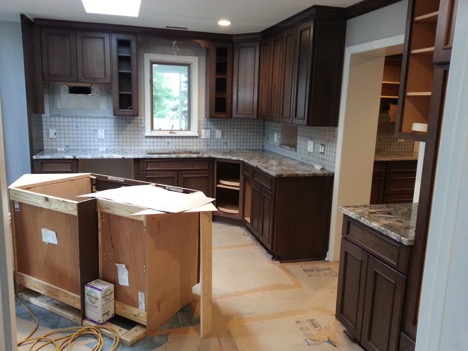
Are you thinking about taking the plunge and renovating your home? Have you been looking around the house thinking, “Wow this floor sure is showing its age,” or “This kitchen used to be fabulous… in 1987,” or “Now that we have the money, why don’t we add that sunroom we always dreamed of”? Maybe you are a young contractor, ready to spread your wings and open your own company. If so, to successfully navigate your exciting new undertaking it is important to understand the nuances of the Maryland home improvement laws.
In the first part of this series on the legal implications of home improvement, I will provide an introduction to home improvement law and discuss the initial contract negotiating phase of a renovation project.
To protect homeowners, the Maryland General Assembly created the Maryland Home Improvement Commission (“MHIC”) and gave it the power to regulate home improvement.[1] What exactly is home improvement? Home improvement is defined as: “the addition to or alteration, conversion, improvement, modernization, remodeling, repair, or replacement of a building or part of a building that is used or designed to be used as a residence or dwelling place or a structure adjacent to that building” and “an improvement to land adjacent to the building.”[2] Thus, “home improvement” may even encompasses certain “improvements” that may not be obvious, such as installing a permanent hot tub, window tinting, storm windows, and even certain types of cleaning and waterproofing. On the other hand, work done to commonly owned areas of condominium complexes or to buildings that contain more than four residences is not considered “home improvement.”[3]
The MHIC has outlined substantial requirements to protect the homeowner from unscrupulous contractors. The MHIC requires that all contractors be licensed[4] and that all home improvement contracts contain certain language. For example, all contracts must contain the contractor’s MHIC license number[5] and the MHIC phone number.[6] One of the MHIC’s newest requirements compels all home improvement contracts presented after July 31, 2013 to state:
(1) Formal mediation of disputes between homeowners and contractors is available through the Maryland Home Improvement Commission;
(2) The Maryland Home Improvement Commission administers the Guaranty Fund, which may compensate homeowners for certain actual losses caused by acts or omissions of licensed contractors; and
(3) A homeowner may request that a contractor purchase a performance bond for additional protection against losses not covered by the Guaranty Fund.[7]
If a home improvement contract contains an arbitration clause, the clause must comply with specific state regulations.[8]
When negotiating the terms of your project, be sure to remember that a contractor may not accept more than 1/3 of the contract price as a deposit or down payment and may not require or accept any payment until the contract is signed.[9] Depending on the size of the job, the contract may also lay out what is called a draw schedule. A draw schedule provides certain benchmarks or targets for the contractor. As the contractor achieves these benchmarks, he or she is entitled to additional payment. From the contractor’s perspective, draw schedules are a vital mechanism to provide structured funding for jobs that may otherwise be too costly for the average contractor. From the homeowner’s perspective, the draws keep a contractor moving forward by providing immediate incentive to get to the next phase. Negotiate these targets to efficiently get the job done.
Finally, discuss with the contractor whether “time is of the essence.” While a contract must give a general estimate of time for completion[10] there is generally no penalty if the job drags on. A “Time is of The Essence Clause” provides a firm date for completion. It legally signals that if the job is not substantially complete by a certain date, the homeowner will be damaged in some way. Such a contract term often pairs with a “liquidated damages” provision. For home improvement contracts, “liquidated damages” is a predetermined monetary value of the harm caused by the delay.
Home improvement is an exciting and stressful undertaking. It invariably requires significant investments of time, money, and energy. When presented with a home improvement contract take your time, review it in its entirety and even visit the MHIC website. If you have any questions or need advice contact your attorney.